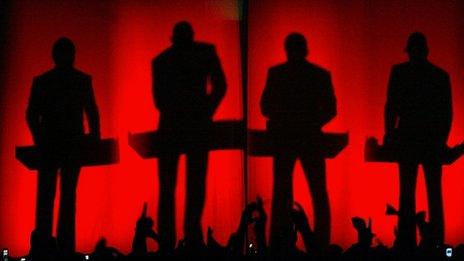Kraftwerk founder Florian Schneider dies at 73
- Published
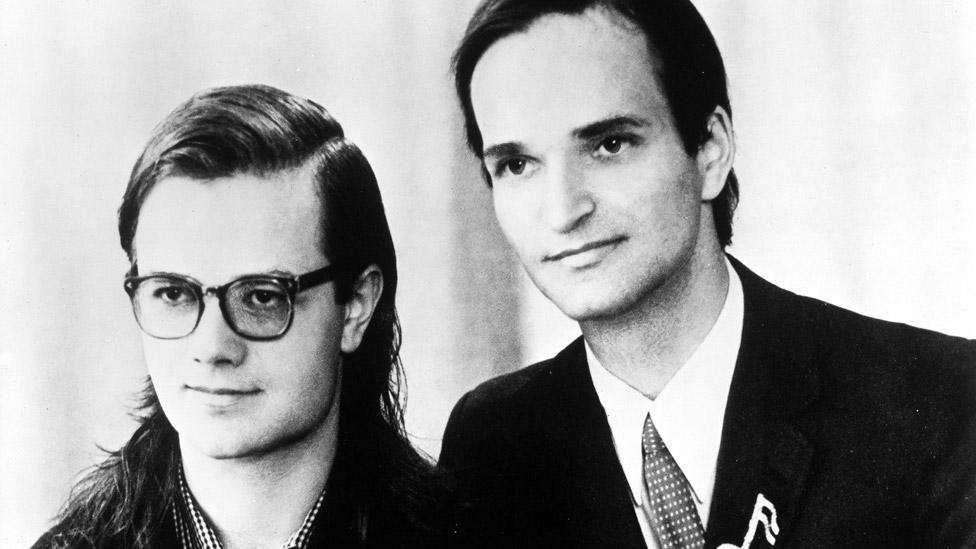
Ralf Hütter (left) and Florian Schneider were Kraftwerk's founders and core members
Florian Schneider, co-founder of highly influential electronic pop group Kraftwerk, has died at the age of 73.
The German quartet set the template for synthesiser music in the 1970s and 80s with songs like Autobahn and The Model.
They achieved both musical innovation and commercial success, and inspired scores of artists across genres ranging from techno to hip-hop.
Midge Ure described, external Schneider as "way ahead of his time", while singer Edwyn Collins summed it up, external with: "He's God".
Schneider formed the group with Ralf Hütter in 1970, and remained a member until his departure in 2008.
A statement said he "passed away from a short cancer disease just a few days after his 73rd birthday".
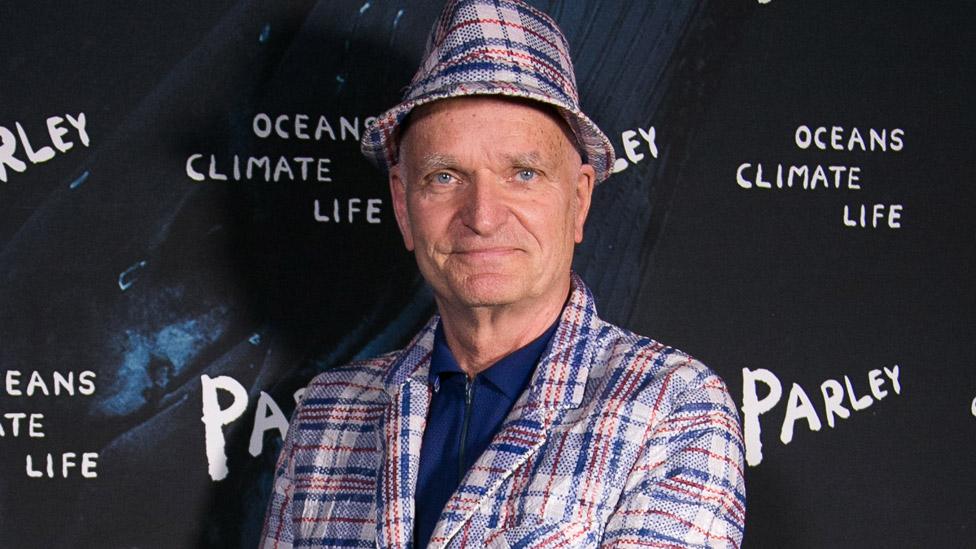
Schneider in a suit made from recycled plastic to support a campaign to stop plastic pollution in 2015
Tributes flowed from the music world. Spandau Ballet's Gary Kemp said Schneider was "such an important influence upon so much of the music we know", and had forged "a new Metropolis of music for us all to live in".
Allow X content?
This article contains content provided by X. We ask for your permission before anything is loaded, as they may be using cookies and other technologies. You may want to read X’s cookie policy, external and privacy policy, external before accepting. To view this content choose ‘accept and continue’.

Duran Duran keyboardist Nick Rhodes remembered, external hearing Autobahn and "how radically different it sounded from everything else on the radio".
It "sparked my lifelong admiration for their innovation and creativity", and the group's "influence on contemporary music is deeply woven into the fabric of our pop culture", he wrote.
OMD said they were "absolutely devastated" at the news, and Jean-Michel Jarre also paid tribute.
Allow X content?
This article contains content provided by X. We ask for your permission before anything is loaded, as they may be using cookies and other technologies. You may want to read X’s cookie policy, external and privacy policy, external before accepting. To view this content choose ‘accept and continue’.

Allow X content?
This article contains content provided by X. We ask for your permission before anything is loaded, as they may be using cookies and other technologies. You may want to read X’s cookie policy, external and privacy policy, external before accepting. To view this content choose ‘accept and continue’.

The long list of artists to have been influenced by Kraftwerk included David Bowie, who named the track V-2 Schneider on his Heroes album after Schneider; as well Depeche Mode, New Order and Daft Punk.
Coldplay used a section from Kraftwerk's Computer Love in their hit Talk, while Jay-Z and Dr Dre borrowed from Trans Europe Express for their track Under Pressure. Kraftwerk reputedly turned down Michael Jackson, who wanted to collaborate.
Kraftwerk's 1975 British TV debut, demonstrating Autobahn's “machinemusik"
The group faced resistance in the British music press at first, but went on to achieve both musical innovation and commercial success.
They broke through with the hypnotic Autobahn in 1975, and went to number one in the UK with the double A-side single The Model/Computer Love in 1982.
Even Kraftwerk's image was mechanical - during the 1970s, they began to portray themselves as robotic figures, dressed identically and standing in a row behind keyboards on stage.
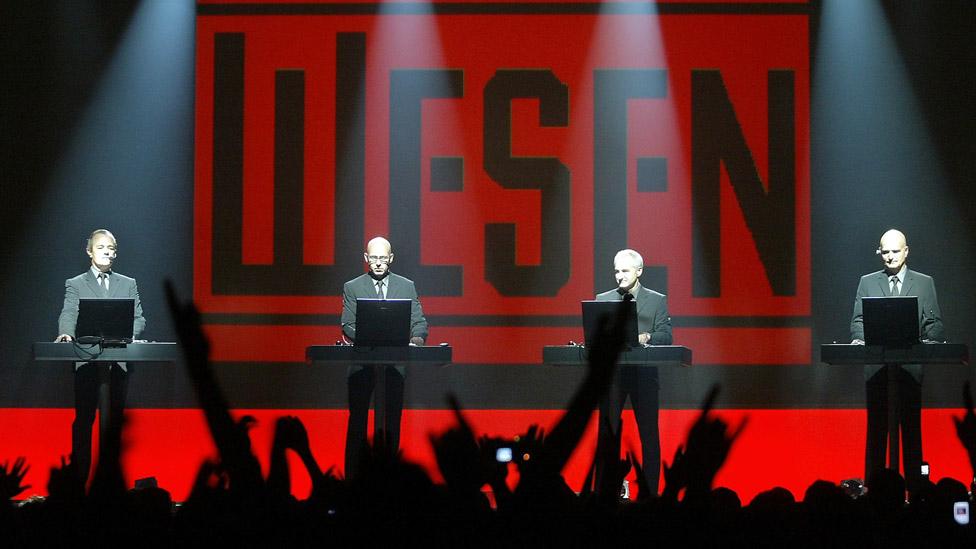
Kraftwerk on stage in 2005
With striking album covers adding to their visual impact, their artistic as well as musical identity led to a series of acclaimed residencies in galleries like New York's Moma and the Tate Modern in London in the 2010s.
Schneider had left by then. He and Hütter remained famously enigmatic, but Hütter told The Guardian in 2009, external his bandmate had not been "really involved in Kraftwerk for many, many years".

'The electronic Beatles'
Analysis by Mark Savage, BBC music reporter
During the mid-70s, the band's allegiance to what they called "robot pop" set the sonic template for everything from hip-hop to house music via EDM and techno.
In some quarters, they were dubbed "the electronic Beatles", and it's hard to disagree.
Electronic music had existed before - from the musitron solo on Del Shannon's Runaway to the mind-expanding Doctor Who theme, recorded by the BBC's Radiophonic Workshop in 1963.
But Kraftwerk developed a new musical vocabulary, sculpting hypnotic, low-frequency sounds that celebrated Europe's romantic past, and looked forward to its shimmering future.

Follow us on Facebook, external, or on Twitter @BBCNewsEnts, external. If you have a story suggestion email entertainment.news@bbc.co.uk, external.
- Published30 July 2019
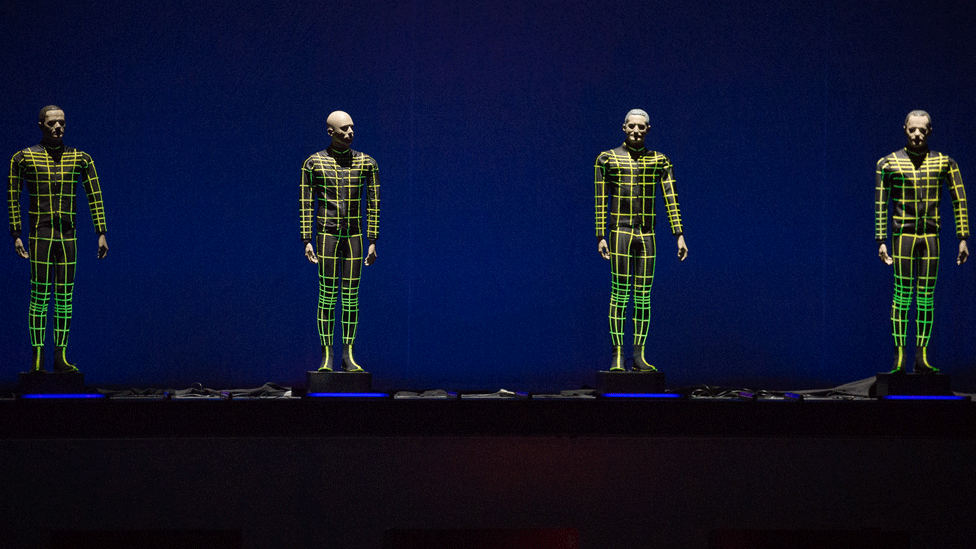
- Published22 January 2015
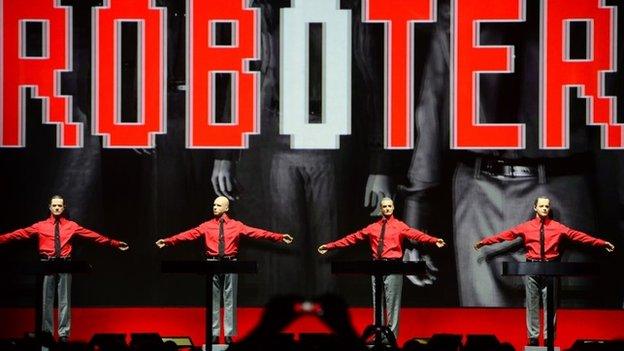
- Published7 February 2013
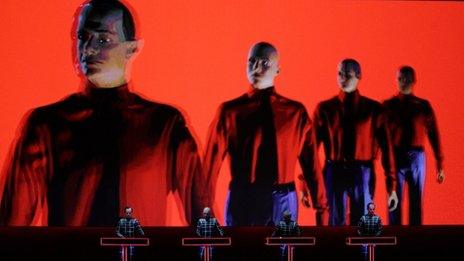
- Published7 February 2013
